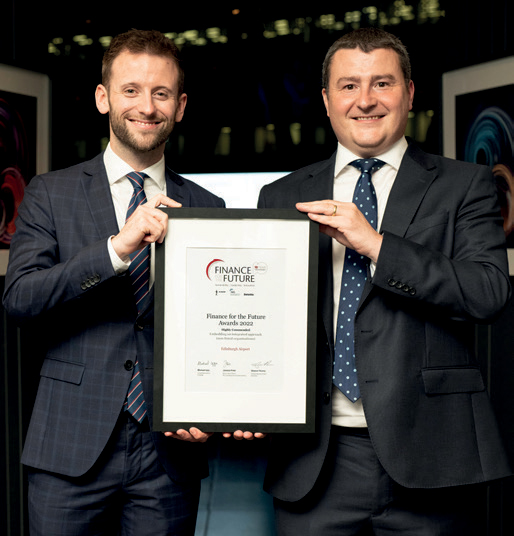What?
In June 2021, Edinburgh Airport launched its Greater Good sustainability strategy. This includes commitments and targets across four strategic pillars: Zero Carbon, Trusted Neighbour, Scotland’s Best Business and Enhancing Scotland.
A major target within the strategy is to become net zero by 2040 across scope 1, 2 and 3 greenhouse gas (GHG) emissions. Carbon emissions and other sustainability indicators aligned to the Greater Good strategy are tracked on a quarterly basis through a balanced scorecard.
The finance team has been a driving force for developing the sustainability strategy and integrating sustainability into day-to-day operations. As well as its significant involvement in setting targets, measuring non-financial indicators and ensuring accountability through robust reporting, the team takes a proactive approach to embracing sustainability in its work.
Edinburgh Airport has not been afraid to tackle sustainability issues. The judges were particularly impressed with the way in which Edinburgh Airport embraces the challenges associated with operating in the aviation sector, rather than adopting a defensive approach.
Why?
As a major airport and influential business in Scotland, it is important to Edinburgh Airport to consider its social and environmental impact. Reducing scope 3 carbon emissions is a crucial element of the broader impact, as the bulk of emissions in the airport’s value chain are produced by airlines.
Edinburgh Airport’s shareholder is a private equity firm with long-term investors, such as pension funds, that are focused on ESG performance. This has ensured that sustainability is a major consideration for the airport and its shareholder. Lenders too are increasingly concerned with understanding and managing climate-related risks in their portfolios.
Sustainability is also significant to the workforce and to stakeholders beyond the airport. Aviation is an area that is coming under great scrutiny as people become more aware of the impact of climate change. Through its work and partnerships, Edinburgh Airport aims not only to tackle carbon emissions in its own value chain but to contribute to wider change and a sustainable aviation industry. The finance team recognises that it has the skills and experience to play a major role in this work and is well-positioned to drive change within the organisation.
Our view is that carbon is the enemy here, not aviation, and we’re doing what we can to support the decarbonisation of aviation. One of the roles that finance has played is around pricing, and incentivising airlines to behave in a way that is conducive to managing our scope 3 emissions. We’ve introduced sustainability charges and environmental rebates.

How?
The finance team has taken the lead in embedding sustainability at Edinburgh Airport, from reshaping governance structures to embracing TCFD:
- The board delegated day-to-day responsibility for sustainability to a new sustainability subcommittee. Finance advocated for this structure and developed the terms of reference. The CFO sits on this subcommittee. The scope of the audit and risk committee also expanded to include internal controls, assurance and risk relating to sustainability. An executive forum meets monthly to discuss ongoing sustainability projects and activities.
- Developing the Greater Good strategy started with a materiality assessment to understand the most relevant social and environmental considerations for the airport. The strategy includes a mixture of longterm targets – such as the 2040 net zero goal – and annual targets. Finance introduced a balanced scorecard to track these, reporting progress on a range of KPIs across the strategy’s four pillars.
- To bring the Greater Good strategy directly into its work, finance set its own departmental three-year plan. In the plan, the team set out sustainability priorities, planned resourcing to achieve them and put in place sustainability objectives for all finance staff. The team discusses sustainability-linked finance projects in a monthly meeting, with the head of sustainability attending to provide subject matter expertise
- Finance introduced a carbon price to factor carbon emissions into decision making, setting the initial price at £50 per tonne, which will be increased each year. The carbon price was applied in a decision to transition the airport’s energy entirely from fossil fuels to biogas. It also strengthened the business case for a proposed solar farm. The finance team developed the proposals and included the carbon price in the financial appraisals.
- Edinburgh Airport used its position to introduce pricing incentives for airlines to use cleaner aircraft and transition to electric aircraft. Finance developed the pricing proposal, working closely with the airport’s commercial team.
- Led by finance, the airport also developed a supplier pledge in late 2021. The pledge sets a minimum standard for suppliers and covers a range of social and environmental considerations, including carbon emissions, human rights and the living wage. Finance assessed the financial impact of including the real living wage in the pledge and included this analysis in the business case. The airport plans to work directly with suppliers who haven’t signed, to influence them to adopt more sustainable practices.

Download the case study
Want a copy of this case study? You can download a PDF version using the link below.
